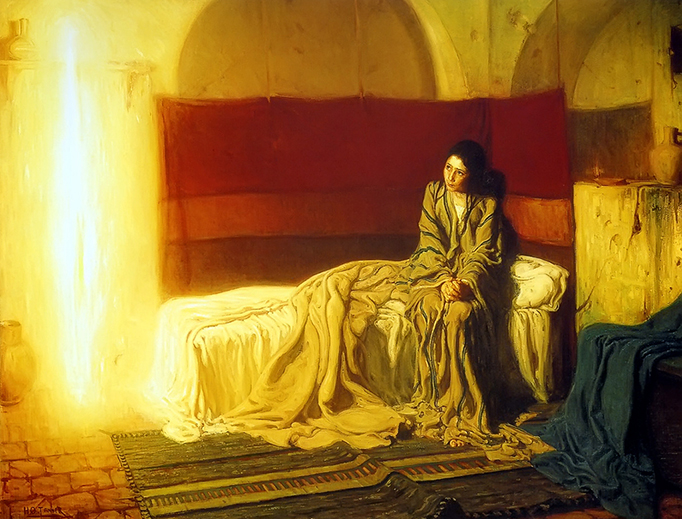Joseph and Mary Learn of the Coming of Jesus
In the Gospels of Matthew and Luke, we read unique stories about different people’s reaction to the announcement of the coming of Emmanuel. Over the next several weeks, we will examine and reflect on each of their experiences as recorded in Scripture, and how they prepared for the coming of Jesus.

As we approach the Christmas season, I am always drawn to the opening chapters of the Gospels of Matthew and Luke especially. Each of these two Gospels invites the reader into the story at the time of the birth of Jesus. (Mark’s Gospel opens at the outset of Jesus’ public ministry, and John’s Gospel goes all the way back to the beginning of the creation of the world).
As we open the pages of Matthew and Luke’s Gospel, some of the first names that appear in the story (not just in a genealogy) are those of Joseph and Mary–perfectly understandable in that these two were there at the birth of their son, Jesus. But of great importance, and what I would like to focus on this week and in the coming weeks, is the reaction that both Mary and Joseph displayed in learning of the coming of this soon to be born baby.
The Gospel of Matthew begins with a genealogy on Matthew’s side, beginning with Abraham and working all the way to Joseph and Jesus. As the genealogy comes to a close, the story opens on the scandal of an unwed woman becoming pregnant and Joseph’s decision or choice to call off their engagement quietly, so as not to humiliate Mary. What is so interesting about this account to me is that Matthew has just spent the valuable opening to his Gospel in making a pretty significant investment in Joseph, drawing his lineage through the patriarchs of Abraham, Isaac, and Jacob, the kings of David and Solomon, important figures during the exile of Israel such as Zerubbabel, and many more. But as Matthew begins the story, this important man Joseph is ready to bow out of the story completely! He is going to call of the engagement (something perfectly within his rights), and just like that the story of Jesus would be significantly altered, if not changed entirely.
However, God is at work. A messenger from God appears to Joseph and announces just who this baby is that is to be born. This baby is to be the one the prophets told about: Emmanuel–God with us. And Matthew 1:24 changes the course of this story. Joseph wakes up and did just as the angel from God commanded him, taking Mary as his wife. He begins to prepare to raise this son who is of God and from God.
We’ll come back to that in just a moment.
The Gospel of Luke begins with a different child’s birth: John the Baptist. There are many ties in the birth of John the Baptist to other parallels in Scripture, such as the story of Hannah and Samuel in 1 Samuel. But as the story progresses, we find ourselves moving toward the person of Mary, John the Baptist’s aunt or great aunt (family trees were never my speciality!). Mary, like Joseph, is a little bit hesitant at first upon seeing the messenger from God. Upon hearing the news of the child that is to be born, Mary also follows the instructions of the messenger and responds with obedience. In fact, Mary is led to sing a song that has changed and continues to change the course of human history. It is a song not celebrating the powerful and the strong, but supporting the weak and lowly. It is a song that reminds us that God does not come as a conqueror but as a comforter. God does not come as a political enforcer but as a physician without equal.
Both Mary and Joseph’s story include the announcement of the birth of Jesus, their choice to be obedient and faithful to what God is calling them to do and to be, and a prophetic understanding that this child would change the world. Joseph knew that Emmanuel had come. God is here. Mary knew that God’s presence meant that the Kingdom of God was putting the kingdoms of this world on notice. The ways of dominance, power, and violence would no longer be the norm, but instead, God’s Kingdom of humility, gentleness, and love would become stronger.
The birth of Jesus was imminent. God’s very self was imminent. Mary and Joseph both responded with faithfulness.
Which leads me back to our opportunity now for reflection. Do we believe as Mary and Joseph did? And more importantly than what goes through our minds, what are we ready to do to be faithful and obedient? This time of year is always filled with reminders about the person of Jesus, especially the birth narratives. How does the birth of Jesus lead us into further faithfulness to God? How can we be like Joseph who changed his life (and thus changed the story of history forever)? How can we be like Mary who sang of how the birth of Jesus would change the world forever?
It is my prayer that as we reflect on these responses of those who were with Jesus at his birth that we too will be challenged by God’s Spirit to continue to be faithful, even in ways that surprise us. May we be willing to faithfully follow our God wherever God leads.

